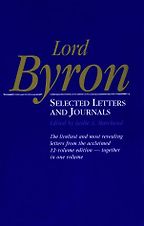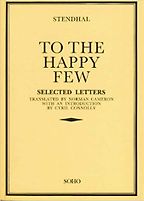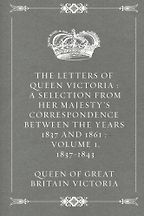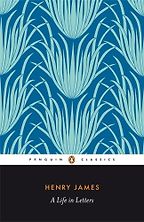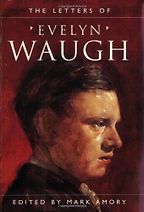You’ve chosen the theme “great letter writers”, and picked four writers and one queen to talk about. But tell me, why should we be reading their letters?
First of all, it’s because the letter is supposedly a dying form in our own time – replaced theoretically by the email, the text, Skype, by ordinary conversations on our mobiles, et cetera. It no longer has the importance that it used to have. But it is, I think, an irreplaceable form. Apart from anything else, it’s physical. At the moment, I’m reading the manuscript letters of a 17th century woman with the wonderful name Brilliana Harley.
And are they brilliana?
They are brilliana. They’re absolutely wonderful. And these letters actually have a sort of physical quality to them. They’re different colours and shapes. You feel almost like stroking them and taking them for a walk, and feeding them with pedigree chow. They have this independent life, as it were. Each letter has a personality in a way which, I think, one can’t necessarily say for emails.
The other thing, generally, about letters is that they allow us into a person’s intimate life. We are snooping. And the really good letter declares the personality, in a wide but at the same time intimate way. Really good letter writers, if they are writers themselves – novelists like Henry James, or poets like Byron – often rival their own creations in their letters. Their letters are as good as their novels or poems. So the letter itself becomes a literary form by instinct on the part of the writer.
But why should we care about these people’s intimate lives?
Because of the completely unashamed way in which they give themselves to us in their letters. Their letters say, “Look at me. I am alone with the sheet of paper and the pen” – Evelyn Waugh sometimes used the typewriter, but in all the other cases it was the pen – “This is how I am. Take me or leave me.” It’s the immediacy of it, the unbuttoned quality of it, that we love. In the case of Queen Victoria, there were a lot of buttons to undo!
How is reading Byron’s correspondence with his lovers any different to reading Cheryl and Ashley Cole’s messages to each other after some journalist has hacked their phone?
I don’t think that it necessarily is different. I think we are genuinely snooping. And this is what we love. There is an extraordinary series of moving letters that Byron wrote towards the end of his life to a woman he was in love with, which are quite obviously private. But anyone who is a decent letter writer has – however much they may deny it – a little voice at the back of their mind which says, “Someone else is going to read this letter in a later generation.” There is always the slight quality of writing for posterity, even though you are writing for the moment, and for one person, and as intimately as you possibly can.
I’m not au fait with the Coles’ correspondence, or Hugh Grant’s, Jemima Khan’s, George Michael’s and God knows who else whose phones have been hacked. But I don’t think that those are necessarily written for posterity. For the majority of written letters, even if the person is not a creative writer, I think there is something that wishes, if the letter is any good, that it will endure beyond a few hours and not end up in the waste paper basket.
So you haven’t read the collected texts of George Michael?
I’m afraid I haven’t. Sorry. But no doubt we shall get there.
Let’s get there by way of Lord Byron – who led a very interesting life, certainly worthy of prying into. Tell us about his letters.
The wonderful thing about Byron’s letters is the extraordinary variety of tones that they have. They convey a whole range of different personalities wrapped up in a single individual. Byron can be extremely funny, he has an extraordinary verbal dexterity. There’s a wonderful letter, for example, describing a drunken night out with Sheridan, the dramatist, by then quite elderly. They all get absolutely rat-arsed. And then they have to get Sheridan down the stairs to his carriage, a tremendously difficult operation. Byron writes, “We had to get him down the damned, corkscrew staircase”, and you have this idea of all these men – themselves drunk – trying to negotiate Sheridan, who was quite a large figure, down this narrow, spiral staircase. What fun that is.
“The wonderful thing about Byron’s letters is the extraordinary variety of tones that they have.”
But then at the end of Byron’s life, a totally different figure emerges in the letters he wrote to Teresa Guiccioli, who was his so-called last great love. (Actually, she wasn’t his last great love. There was a Greek boy called Lukas Chalandritsanos, to whom Byron did not write letters because he was there all the time in Byron’s last days.) But Byron’s letters to Teresa are totally different. They are written with this extraordinary ardour and warmth, and, for Byron, amazing vulnerability. When you read them, you think this man is so vulnerable, has so little confidence, is so in need of reassurance from this much younger woman – she was only in her twenties, if that. She is calling the shots and Byron is desperate. It’s a completely different tone of voice.
And then when Byron is writing to his publisher, John Murray, another personality comes out. A mixture of intimacy and awareness that this man is his commercial agent, but also that he, Byron, was a lord. There was a lot of snobbery about Byron, he really did stand on his aristocratic dignity a lot of the time. And that comes out. Though at the same time he’s very charming with Murray, he wants to keep him on-side. So you get this vast range of voices in a single correspondence. And that’s what makes any volume of Byron’s letters a great pleasure to pull from the shelves and leaf through.
It strikes me that the Romantic movement in poetry, or its second generation at least, is very much one of projection of bardic identity. In Keats’ letters, for instance, he is endlessly saying adieu in a very self-consciously Romantic way. Do you think there is the same self-image for Byron – of himself as the great bard, lord and lover – which he feels he must live up to in his letters?
I think there is up to a point. Keats’s were of course absolutely marvellous. In a way I wish I’d included those, because he is as good a letter writer as Byron. Byron kept his bardic stance for the public man, but very seldom do we find a sense of his poetic calling. I think he felt it was something which a man like him – a lord like him – didn’t need to show. That it was almost infra dig to be the poet, because that’s not what noble lords did. It was a talent. It was of course the talent that was to make him famous. But all his life he wanted to be seen as the Regency dandy boxing aristocrat, doing manly things and manly things with women. The poetry was meant to seem nonchalant, although we know that it was, in his case, compulsive. He had to be a poet, and you realise this when you read his poetry.
Was he the Hemingway of his time?
Yes, I think in a way he was. And this comes out in the letters too. It’s another of the multi-faceted qualities that he has.
Let’s move on, chronologically, to Stendhal’s letters.
The wonderful thing about Stendhal is that his romance as a writer was eternally with himself. There is a book about Stendhal in French called Monsieur Moi Même – Mr Me. There is no writer like him, at all, anywhere. He is an utterly unique personality, not that you can qualify uniqueness. His letters are a kind of log of the self, and they’re very cleverly calibrated in this way to the correspondent. Of all the letter writers that I’m talking about, he is most conscious of whom he is writing to and what will interest them. But always, in a subtle way, he comes back to the ego of the self.
Stendhal wrote wonderful letters to his sister, which we might perhaps find patronising – she was younger than him and had less experience of the world – but you constantly get a sense of the value he puts on the presence of the other person. And correspondingly (if one can use that word) there is the sense that this other person might betray him, might not rise to the challenge of the value that he sets on them. And that so often happened. Many of Stendhal’s friends disappointed him. They weren’t Stendhalian enough, at crucial moments when he needed them to be. So you have this constant sense of “how are you going to respond to what I’m telling you?” Not asked directly, but a subtext throughout the letters.
“There is no writer like him, at all, anywhere.”
His letters were written from all over the place and are crammed with all sorts of different subjects, because he led a very interesting life. He went all over Europe. He visited England several times, and went to places we wouldn’t associate him with. For example, Stendhal in the Black Country, or in the Midlands. Good heavens, one doesn’t think of him in places like Birmingham and Dudley, but there he was.
What did he think of Birmingham?
It was sort of black and messy and full of factories. “Les usines de Birmingham.” He had amazing adventures at a brothel in the area we now call Waterloo, in Lambeth [in south London]. He went to Russia, and was in the retreat from Moscow [in 1812]. He arrived in Italy with the French army [during the Napoleonic wars] and discovered Milan – which became, for him, the great city of the heart. He was, in a kind of adopted way, more Italian than French. And all this international experience becomes the prism through which this fascinating correspondence is filtered.
He was an incorrigible womaniser, his life was chock full of unrequited love, and he seemed to prefer desire to consummation. Does that come across in his letters?
Yes! Absolutely, it very much comes across. It was the posture of the lover, rather than the reality, which was important to him. I think the great influence for him in childhood was his uncle, Romain Gagnon, who was a late 18th century libertine figure who would have appeared in Les Liaisons Dangereuses – a typical ancien régime womaniser. In a way, he was the role model. Stendhal always had to have an attachment or an object of desire. But what we find in the correspondence with these women is that he didn’t just want them for physical satisfaction, he really loved and was interested in these women as intellectual, speaking, breathing human beings.
In this respect we can compare him with another great late 18th century figure – whom I happen to deeply admire personally – and that’s Casanova. Both of them were fascinated by the feelings of women. They were fascinated by women as individuals. And they needed the presence of the feminine in their lives. This is what is so marvellous about Stendhal. He gives you, in his letters, the sense that these women are much more than mere machines for the satisfaction of the male. And that is so unusual in that day and age. Maybe it’s unusual in our own day and age. Certainly there are plenty of men today who would take the same view.
Next up is Queen Victoria. You said earlier that she had a lot of buttons to unbutton. Indeed, the adjective “Victorian” suggests that. But the letters and diary entries that I read gave a very different picture.
Victoria was completely un-Victorian. She had an extraordinarily broad-minded, humane quality to her. It’s very seldom in her letters that you find what we might (incorrectly) think of as a Victorian narrowness of viewpoint. She has an amazing breadth of comprehension, which is not necessarily related to anything that she’s read. Because although she did read books, she wasn’t an intellectual. It’s rather a sort of instinctive wisdom, possibly derived from her very bizarre childhood. It’s not a childhood one would have wished on anyone – with an awful mother and sinister hangers-on in court, and the sense that apart from her old uncle William [IV] on the throne, she was the only one of her family left and would be Queen.
A terrific self-confidence comes across in her letters. The absolute, cast-iron belief that she is number one and there is no challenge to that. One of her amusing human faults was that she clearly resented being upstaged by other people. Either by other sovereigns – she also wanted to be number one sovereign in the eyes of the world – or by celebrated personalities. For example, there’s a letter which she wrote to Lord Lyons, British ambassador in Paris in the late 19th century, about the huge Paris funeral of Victor Hugo. She quite obviously thinks, “Why is this man getting all this attention?” And there is a frisson, a scintilla of envy that goes through it. So Lyons has to give her a great long description of the funeral. Apart from anything else, she was also personally very interested in funerals, illness and death.
Her letters to ministers are notorious for their downrightness and directness. “The Queen believes…” et cetera, written in the third person and never “I”. But the great correspondence, that goes across 40 years, is with her eldest daughter, Princess Victoria, who become Empress of Germany, the so-called Empress Frederick. In that she just lets herself rip. It’s a real rollercoaster of a correspondence. It’s emotional, it’s gossipy, it’s crammed with comment on contemporary events. Sometimes it’s a ding-dong battle between the two women, and I would love to have the other side of the correspondence, which was never published but presumably exists somewhere. She often takes a point of view that you don’t expect. There is this unexpectedly liberal side to somebody whom we think of as being conservative and reactionary.
Also a very human side, in letters after the death of her son-in-law for instance. Others are quite crass really! I jotted down one in which she writes, “I think those ladies who are always enceinté [pregnant] quite disgusting. It is more like a rabbit or guinea pig than anything else.”
The physicality of womanhood was something that both fascinated and repulsed her. Although she had nine children and was what might be called good breeding stock, she saw pregnancy as the occupational hazard of sex with Alfred.
Five Books interviews are expensive to produce. If you're enjoying this interview, please support us by donating a small amount.
It’s the greatest lie that Victorians didn’t have emotional lives, or suppressed their physicality.
Yes, there is this other side to our conventional idea of Victorians. Queen Victoria, as I said, was not a Victorian. She had been brought up in a time – the late Regency and the reign of George IV – when people winked or cynically shrugged their shoulders at things. She had inherited a lot of those attitudes and values. This is probably why she hated bishops. She hated the clergy generally, although obviously she had to deal with it a lot as head of the Church of England. But in a way it reminded her of a stuffiness and disapproval that was not something with which she had grown up.
Next we have Henry James.
Henry James! The greatest of all letter writers, I think, without a doubt. Wonderful. Extraordinary. He has an uncanny ability to connect with the feelings of his correspondents in particular situations. His condolence letters, for example, to friends who have lost close relatives, are the best condolence letters ever written. They are a warm embrace, epistolarily speaking.
At the same time, they go to the heart of the individual problem, and they’re written without self-conscious piety. He wasn’t a religious man – there isn’t a religious aspect to them – but there is a spirituality in the way he writes to certain people, particularly women.
He had an extraordinary understanding of women. The women in his novels are very profoundly observed. They are always the most important figures. He writes, I think, much better about women than about men. He’s also very good at distilling an experience. What he doesn’t put into his novels so often finds its way into his letters. Descriptions of places, of weather, of atmosphere, of landscape, of amusing moments in a particular city or stretch of country. What we don’t find in James’s novels are always in James’s letters.
He is also a great encourager. There is a wonderful sense of him wanting his friends to do well. Even if he doesn’t think that such and such a book is the best product of a writer, nevertheless he can find something that will encourage the writer, if there has been a failure, to pick himself up and get on. This sense of wanting his friends to do well – of helping them to move on – is elemental in James’s correspondence. As you read it, you think this is the greatest human being ever. You long to meet him, and you realise why he was such a popular figure socially. Some people did find him a bit prosey and, well, Jamesian. But most people absolutely adored him, he was invited everywhere. He was terribly good with children – that’s always a good sign, where human beings are concerned.
Of all these correspondents, I think he is the most fully rounded. More so even than Byron. There isn’t any sense that he’s trying to strike a pose. There is a complete lack of pomposity. And that is such an essential corrective to the general view of James as a sort of ponderous, obfuscating, deliberately obscure writer. The clarity of his perceptions is outstanding.
Finally, Evelyn Waugh. Who once said, “Beware of writing to me. I always answer.”
Yes! And he did. The thing about Evelyn Waugh is that you must take everything with a pinch of salt. Because there is this kind of parallel universe in which he lives. The pleasure of reading his letters is to see somebody at work on constructing a personality, on constructing a self. Which isn’t necessarily his true self. Do we ever get to the true self in Waugh? I think we don’t. I don’t think he necessarily knew where it was himself. What you get instead is this apparently tweedy, peevish, reactionary figure – but underneath it amazingly perceptive and very funny.
There’s a sort of Edward Lear, Lewis Carroll quality about Waugh’s world in the letters. He always wants to turn a perfectly ordinary situation into something absurd. There’s a wonderful description of some soldiers doing war-time exercises in a park belonging to somebody called Lord Glasgow. And Lord Glasgow goes to the loo, pulls the chain, there’s a terrific explosion and all the windows of the castle blow out. Of course it probably never happened like that. But this is a moment from Decline and Fall, or Vile Bodies, or something like that. All the time, in his letters, he’s reaching after these absurdities.
“The pleasure of reading his letters is to see somebody at work on constructing a personality, on constructing a self.”
He’s also enjoyably sharp, and acid and acerbic with his correspondents. Even those he loves, he bites them a lot of the time. The letters to Nancy Mitford or Diana Cooper – yes they are very amusing and they rattle on terrifically, but all of the time you are conscious of moments when he snaps. And the correspondents themselves clearly realised that they were playing with fire, that this was a loose cannon – and as such all the more fascinating.
I gather he would start drinking very early in the day. Can you tell?
You can tell up to a point. I think the excuse for drinking was to release things, to oil the flow of discourse. But there isn’t anything fuddled about the letters. Apart from anything else, he is – and has always been thought to be – one of the great 20th century English stylists. In the quality of the English, the syntax, the crispness which is such a distinctive aspect of Decline and Fall. The way he can control a paragraph. The way he can build up to a comic climax in a paragraph, or in a single sentence. He never really wrote a bad sentence. And this is also true in the letters.
By way of coda, I want to return to what we flirted with at the beginning. Which is whether you feel that letter writing is a tradition we have lost.
I think it probably has to be, alas. The occasion for writing letters has in so many cases gone. Nowadays, we still write condolence letters (although some people send condolence emails). We send letters to publications – we write out our objections to things. But the idea of actually sustaining a written correspondence with someone has almost died the death. Which is a great pity. I myself have maintained a written correspondence with my brother, who lives in Italy, for 40 years.
I look forward to reading it when it is published!
Of course, when we write our letters there is just the faintest idea – probably more with me than with him, to do him justice – that these letters will be published. Or we are aware of a gentle reader over our shoulder. But at the same time, they contain all sorts of private jokes and family references that nobody will ever know what one might be referring to. And that is the other joy about these correspondences.
Editing letters is actually sleuthing. Figuring out what on earth “x” is in so and so a letter – who they were, what the person is referring to them as, what the nickname is. Waugh uses a lot of nicknames for various figures, like “Boots” for Cyril Connolly or “Honks” for Diana Cooper.
How is email different? Surely a long correspondence on email is the same thing, if not the same form.
It’s very difficult to explain. I think that a different process goes on between brain and hand in the visual quality that a letter assumes. An email does not assume the same visual quality. In a letter, your handwriting might grow bigger, the spaces between the lines might grow bigger, there are crossings out, there are spelling mistakes. On the computer, we have spellcheck and all these things. The letter remains a physical thing. An email is not, really. In the end it is in the ether.
And somehow feels less permanent, even if in reality it is more permanently stored.
Yes it does. Of course, you can burn letters. In my own family, one of the most infuriating things was when my grandmother died, she had all my grandfather’s letters from the trenches – he was killed a few weeks before the Great War ended – but when my aunt emptied them out of my grandmother’s bureau, on them was “Please burn” and she put them on the fire. So you can, alas, destroy a correspondence. But miraculously, so many thousands of letters survive. I kept all my father’s letters, written to my mother during the war, and they are rather good. But will my nephews hang onto them? I don’t know.
Get the weekly Five Books newsletter
Can you imagine reading the collected emails of the next great writer in 30 years?
I think it will probably come to that. And this is why certain writers, like Wendy Cope recently, have given their collected emails to a library. The process has started.
My theory is that blog posts, often collected into books, will replace published letters. We’re beginning to see that, for example with Ai Weiwei’s Blog.
Yes, I suppose that is the new thing. But I think the letter as a physical phenomenon is not doomed. There may come a time when the world goes “pop”, electronically, and we have to start again with our hands, and with sticks of charcoal on leaves, and make papyrus all over again. It may not be wholly dead.
Is this a fantasy of yours?
Yes, it is in a way. I love emails, I love being able to send emails, but there’s nothing like the pleasure of writing a letter.
Five Books aims to keep its book recommendations and interviews up to date. If you are the interviewee and would like to update your choice of books (or even just what you say about them) please email us at [email protected]
